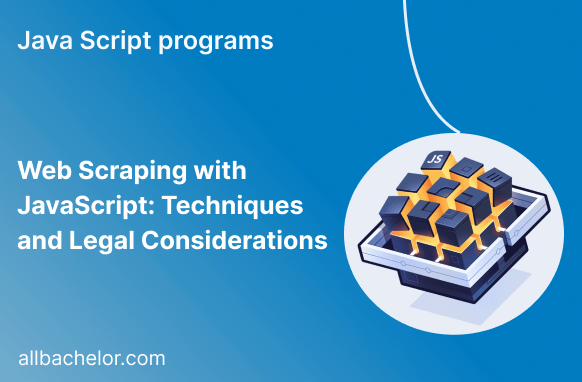In today’s digital era, the internet is a goldmine of information. Businesses, researchers, and enthusiasts are eager to extract valuable data from websites for various purposes. Web scraping is a way to automatically collect data from websites, and JavaScript has become a popular choice for this due to its versatility in dealing with dynamic content. However, while web scraping can be a powerful tool, it’s crucial to understand the legal and ethical considerations surrounding this practice. In this blog, we will explore web scraping techniques using JavaScript and take a closer look at the legal aspects and ethical concerns associated with it.
Part 1: Techniques of Web Scraping with JavaScript
JavaScript offers several powerful methods and libraries to facilitate web scraping. We will discuss two common techniques: using the Fetch API and utilizing headless browsers.
Technique 1: Using the Fetch API
The Fetch API is a modern and efficient method in JavaScript for making HTTP requests. It lets us get data from a specific web address and deal with the response. In web scraping, we can use the Fetch API to fetch the HTML content of a webpage and then use DOM manipulation to extract the information we need. In simple terms, it’s a useful tool for gathering data from websites and working with it in JavaScript.
Here’s a basic example of web scraping using the Fetch API:
const url = 'https://example.com'; // Replace with the target website URL
fetch(url)
.then(response => response.text())
.then(html => {
// Parse the HTML and extract data using DOM manipulation
const data = extractDataFromHTML(html);
console.log(data);
})
.catch(error => console.error('Error fetching the URL:', error));Technique 2: Utilizing Headless Browsers
Headless browsers are web browsers that don’t have a visible window or interface, meaning they can run in the background without showing anything on your screen. Puppeteer is a well-known library for Node.js that offers a convenient way to control these headless browsers, like Chrome or Chromium. This allows you to perform advanced web scraping tasks, even on websites that use a lot of JavaScript to display their content. In simple terms, Puppeteer lets you interact with websites and extract data without actually opening a browser window.
Here’s a simple example using Puppeteer:
const puppeteer = require('puppeteer');
(async () => {
const browser = await puppeteer.launch();
const page = await browser.newPage();
await page.goto('https://example.com'); // Replace with the target website URL
// Wait for specific elements to load if required
await page.waitForSelector('.target-element');
// Extract data using JavaScript evaluation within the context of the page
const data = await page.evaluate(() => {
const elements = document.querySelectorAll('.target-element');
return Array.from(elements).map(element => element.textContent);
});
console.log(data);
await browser.close();
})();Part 2: Legal Considerations for Web Scraping
Web scraping can be a valuable tool for data gathering, but it is crucial to respect website owners’ rights and follow legal guidelines. The legality of web scraping varies by jurisdiction and the intended use of the scraped data. Here are some key legal considerations:
1. Terms of Service and Robots.txt
Before you start web scraping, remember to do two important things. First, read the website’s Terms of Service (ToS) to understand their rules and conditions. Second, check for a file called “robots.txt” on the website. This file tells you if web crawlers, like scrapers, are allowed to access specific parts of the site. Always respect the website’s guidelines and avoid scraping if the “robots.txt” file says not to do it. Following these steps ensures you’re scraping ethically and within the website owner’s permissions.
2. Copyright and Intellectual Property
Make sure that the data you’re scraping is not protected by copyright or other intellectual property rights. Avoid scraping content that is clearly marked as copyrighted or proprietary because doing so could result in legal problems. It’s essential to respect the rights of content owners and only scrape data that you have permission to use.
3. Publicly Available Data
In most cases, it’s more acceptable to scrape publicly available data from websites for personal use or research rather than for commercial purposes. However, even when the data is publicly accessible, it’s essential to be mindful of the website’s rules and policies. Always check if the website allows scraping and respect their guidelines to ensure you’re using the data responsibly.
4. Rate Limiting and Impact on Servers
Do not perform aggressive scraping that could overload the server or harm the website’s performance. It’s important to use rate limiting, which means controlling the speed and frequency of your scraping requests. Additionally, consider caching data locally, which means storing some information on your computer to reduce the number of times you need to request data from the website. These practices help to be respectful of the website’s resources and ensure your scraping activities are responsible and efficient.
5. Attribution and Source Integrity
When using scraped data in public, always give credit to the website as the source of the data. Never misrepresent or take credit for the data as if it’s your own. Properly acknowledge where the information came from to show respect for the website’s efforts and to maintain honesty and integrity in your use of the data.
Conclusion
Web scraping with JavaScript allows developers to extract data from websites effectively. By using tools like the Fetch API and headless browsers like Puppeteer, they can interact with websites and collect information. However, it’s crucial to be mindful of the legal and ethical aspects of web scraping.
Before scraping a website, always check its terms and conditions, and follow its guidelines. Also, think about how you plan to use the data you gather. Being responsible and respectful in your scraping practices is essential. Remember, web scraping should be done ethically, respecting the rights of website owners and using the data in a fair and honest manner.



